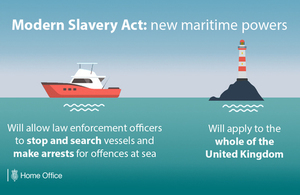New powers to tackle slavery at sea
Safeguarding Minister Sarah Newton announces the commencement of new powers in the Modern Slavery Act.

Graphic giving an overview of the modern slavery maritime powers
Thousands of law enforcement officers across the United Kingdom will be empowered to join the fight against modern slavery at sea using new powers in the Modern Slavery Act which come into force today (8 August 2016).
The new powers will enable officers from Border Force, police forces and the National Crime Agency (NCA) to board and search vessels, seize evidence and arrest offenders, where it is suspected that modern slavery is taking place.
Officers will be able to intercept vessels with reasonable grounds, arrest offenders and rescue victims from ships in UK waters.
Minister for Vulnerability, Safeguarding and Countering Extremism Sarah Newton said:
Modern slavery is a crime that rips victims from their families, trapping them in a cycle of abuse at the hands of ruthless gangs.
Officers from the Shetlands to the Isles of Scilly now have the power to arrest offenders and protect victims from this abhorrent crime whether on board a ship or on our shores.
Our message is clear – the UK is taking action to protect victims.
Offenders arrested at sea for modern slavery offences now face up to life imprisonment for their crimes under the Modern Slavery Act.
The new powers are in addition to the support announced by the government last week, including a new taskforce to coordinate cross-government action, £33.5 million in official development assistance funding and a HMIC inspection to assess police response to modern slavery.
Over 2013 and 2014, the NCA identified 37 potential victims of modern slavery who reported exploitation in the maritime industry. Victims onboard vessels will be brought to the mainland and will be able to access tailored care and support through the National Referral Mechanism, as part of the government’s national care and coordination contract administered by the Salvation Army.